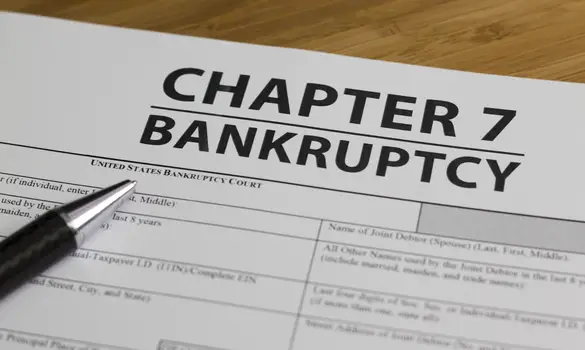
If you are a professional struggling with debt, you may already know that Chapter 7 bankruptcy is not available to everyone. The court will take you through something called the means test to determine your eligibility. If the test shows that you can pay back all or some of your unsecured debts such as medical bills, credit card balances, and overdue utility payments, it means you do not meet the Chapter 7 bankruptcy requirements and instead must file for Chapter 13 bankruptcy. However, before making this decision, learn about the important Chapter 7 vs. Chapter 13 bankruptcy differences. Continue reading for information on Chapter 7 bankruptcy and the requirements for filing.
The Two-Part Calculation Means Test
Passing the means test is not an automatic green light to file for Chapter 7 bankruptcy. It consists of two parts, with your performance in the first part determining whether the second one will be necessary. In the first part, your income will be compared to the state’s median income. If the state’s median is higher than yours, then you can file for Chapter 7 bankruptcy without necessarily taking the second part.
If your family income sits well above the median for the state, you will only pass if deductions for basic and necessary family expenses do not take your income below the median. It is advisable to hire a lawyer specializing in business bankruptcy to help you assess your situation and estimate your chances of passing the means test.
The Means Test Forms
In order to qualify for Chapter 7 bankruptcy, you need to complete the appropriate forms. Keep in mind that you should also learn how to claim bankruptcy and keep your house prior to completing these forms. After you do, you can enter the process fully knowledgeable. There are three forms that you are required to complete. They include Form 122A-1, Form 122A-2 and Form 122A-1Supp. The first form focuses on your current monthly income. The second determines if you have sufficient disposable income or not. Lastly, the final form allows you to discover if you are exempt from the means test. Complete these forms to determine your eligibility for Chapter 7 bankruptcy.
Standard Expenses
Standard expenses are contained in charts created by the Internal Revenue Service, whose purpose is to ensure that individuals living extravagant lifestyles do not take advantage of the Chapter 7 filing. The predetermined amounts include costs for food and clothing, healthcare, personal care and housekeeping supplies, transportation costs, standard mortgage, some housing expenses, etc.
Actual Expenses
Some real expenditures can be used to pass the means test as well. Consider them in order to perform a bankruptcy filing. They include:
- Childcare
- Health insurance
- Court-ordered payments
- Life insurance
- Employment-related expenses
- State and federal income taxes
- Child education expenses
- Charitable contributions
- Debt payments
Disposable Income
Disposable income is what you get when you deduct these expenses from your total income. You will multiply the figure you get by 60 to get your total amount for a 60-month period or five years.
Next, you will compare the amount for the 60-month plan to the amounts in the means test. You have passed the means test if your total disposable income for 60 months is below $7,700. If it is above $12,850, you have failed the test.
What To Do If You Fail The Means Test
Three options are available to you if you ‘fail’ the means test. You can avoid filing for bankruptcy. Instead, consider looking for an alternative to bankruptcy. For example, you can either seek the services of a credit counselor to help you create a debt management plan or negotiate lower payments with your creditors. You can also consider filing Chapter 13 bankruptcy. In a Chapter 13 bankruptcy, you submit to the court a proposal of how you are going to pay your creditors over a period of five years. The last option is to overcome the presumption of abuse.
 Business First Family Business, Accounting, Finance, Investing, Marketing And Management
Business First Family Business, Accounting, Finance, Investing, Marketing And Management